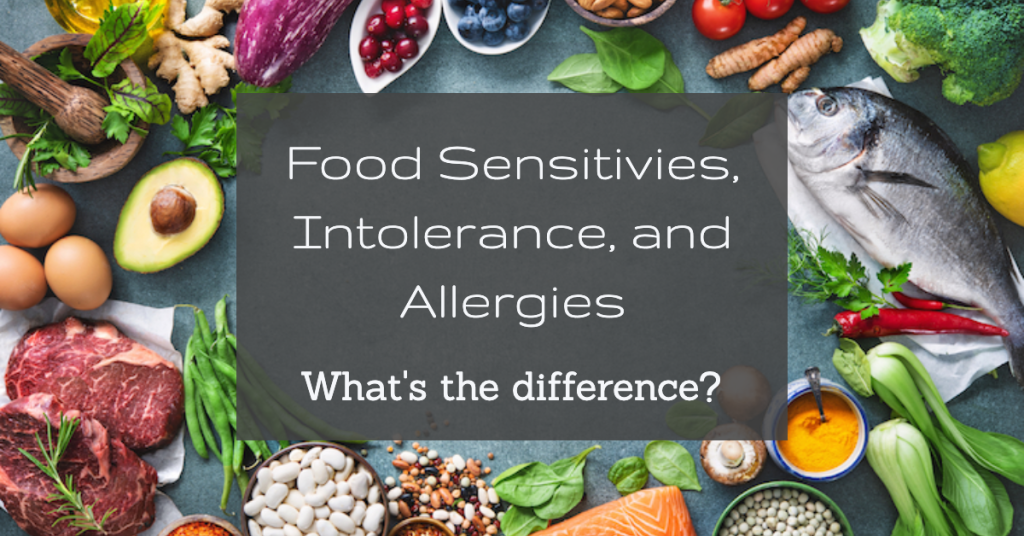
If you’ve ever eaten a food and had a reaction to it, you might assume you’re allergic to that food, and you could be! However, your reactions to a food could also be due to a food intolerance, a sensitivity, or celiac disease.
To relieve any symptoms you may be experiencing, it’s essential to know which you have. So what are the differences?
- A food allergy causes a more significant immune response than a sensitivity and can lead to death in extreme cases. Symptoms include hives, rash, itching and swollen lips, tongue,etc.
- A food intolerance typically means your body has trouble processing or digesting a food. (Lactose intolerance seems to be the most common food intolerance).
- Celiac disease is an immune reaction to eating gluten. It can cause inflammation that damages the small intestine lining and prevents the absorption of some nutrients. Symptoms include abdominal pain, diarrhea, growth delays, difficulty loosing or gaining weight and more.
- A food sensitivity can cause an immune response that could manifest in a variety of symptoms. It means you can eat that food, but you won’t feel well after a few hours. Food sensitivity is the trickiest one because the reaction does not happen immediately and has more of a cumulative effect and a long list of potential symptoms you might experience as a result which are hard to connect.
Why Diagnosing is Important?
Any of the above issues can cause inflammation in the body, and inflammation is the root of many conditions and diseases, including but not limited to:
- Migraines
- Depression
- ADD/ADHD
- Fibromyalgia
- Arthritis
- Ulcerative colitis
- Crohn’s disease
- IBS
- PCOS
- GERD
- Asthma
- Hiatus hernias
- Gastric reflux
- Gastric ulcers
- Inflammatory bowel disease
When a condition is misdiagnosed, it’s almost impossible to manage. You may be prescribed unnecessary medications with potentially harmful side effects that won’t solve the problem since the real problem lies undiscovered.

Should You Test for Food Sensitivities?
Do you have an ongoing health issue that isn’t resolved? Do you have any autoimmune conditions? Do you suffer from any of the following after eating, sometimes immediately after, and sometimes days later?

● Stomach pain or bloating
● Diarrhea
● Constipation
● Dizziness
● Fatigue
● Brain fog
● Joint Pain
● Headaches/migraines
● Acne
● Wheezing, shortness of breath
● Hives
● Swollen lips, tongue, eyes, or face
● Sneezing
● Itchy, red, watery eyes
● Water retention
Why the Mediator Release Test?
There are a lot of home kit tests that promise to test for Food Sensitivities but unfortunately, frequently NOT accurate or limited in the testing components. Research has shown that the widely used, food-specific IgG (or immune complex) tests are NOT reliable and oversimplified.That’s why I recommend the Mediator Release Test (MRT) – one of the truly the best and most accurate Food Sensitivity tests out there. This test is much more sophisticated than an IgG test. The MRT is a blood test component that measures your individual inflammatory response to 170 foods and chemicals. Your blood is sent to a lab overnight that uses a machine to expose it to each freeze-dried food or chemical antigen.
The MRT is an excellent way to determine what foods may be contributing to your symptoms and what foods you’re not reactive to so you know both what to eliminate and what to include in your diet. Dietary changes based on MRT results show significant symptom reduction and provide patients with relief from symptoms they may have lived and suffered with for years. Imagine feeling energized and well from the food you eat rather than tired, sluggish, headachey, and miserable!
The important points to remember include:
- Food can cause different types of reactions. It could be immune reactions and/or a digestive related issue.
- Food sensitivities can cause a variety of symptoms, and often symptoms may not be related to the gut.
- Food sensitivities can be reversed through protocols put together for you by a Practitioner like myself.

Schedule Today!
We are conducting MRT in the office!
The test requires a blood draw, so you’ll only be here for five to ten minutes. Your results will be back in one week and sent to you via email. If you would like to go over your results in detail, we can then schedule a consultation to review your current diet and discuss any changes that will help improve your health and relieve you of the bothersome symptoms you’ve been plagued with, possible for years!
Besides, MRT Food Sensitivity testing we are also testing for Celiac disease and Food allergies – please ask us about our Food Trouble Testing Package.
You don’t have to continue to live without answers and solutions if you suspect you may be suffering from a food sensitivity, intolerance, or allergy.
To schedule, reply to this email or contact the office at 646.436.5311

